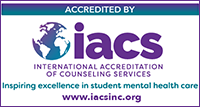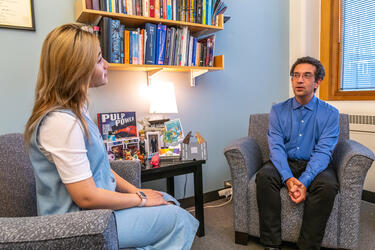
MIT Health’s Student Mental Health & Counseling Services works directly with students to understand and solve problems. Give us a call. Visits are confidential and easy to arrange.
Student Mental Health at MIT
Get started
Self-care resources
Group counseling
Overview
MIT Health’s Student Mental Health & Counseling Services works with students to identify, understand, and solve problems, and to help transform that understanding into positive action.
Clinicians are available for telehealth visits* and in-person appointments. We see nearly 21 percent of the student body each year, and about 29 percent of students in a given class by the time they graduate.
We offer:
Evaluations and consultations
Brief treatment (counseling/psychotherapy and medication)
Outreach, education, and prevention
Urgent care
Support for eating concerns
Advice when you are worried about a friend, colleague, or student
Help for departments, labs, and centers that are dealing with traumatic events, sudden losses, or other troubling situations
*Because some states have laws restricting the provision of telehealth services across state lines, MIT Health’s telehealth services are available only to patients who are physically located in Massachusetts at the time of the appointment.

MIT Health’s Student Mental Health & Counseling Services is fully accredited by the International Association of Counseling Services (IACS). IACS Accreditation is a voluntary, peer review, evaluative process involving a written self-study and the adherence to established standards of practice.
Care Providers
Student Mental Health & Counseling Services
Daniel Becker, LCSW
Counseling Services Clinician
Christine Boie, PMHCNS - BC
Psychiatric Nurse Practitioner
Christina Brothers, LICSW
Eating Disorders and High-Risk Patient Coordinator
Argo P. Caminis, MD, MPH
Psychiatrist
Jonathan C. Chou, MD, MS
Psychiatrist
Julianne M. Croes, LICSW
Clinical Social Worker
Daniel J. Debowy, MD, PhD
Psychiatrist
Michael Di Bianca, PhD
Post-Doctoral Fellow in Psychology
Eliot Fearey, PhD
Psychologist
Linda Finguerra, PMHNP-BC
Psychiatric Nurse Practitioner
Andrew Fuller, MD
Psychiatrist
Joanna Goldsmith, LICSW
Clinical Social Worker
Mia Gore, MD
Psychiatrist
Yvette N. LeBlanc Gundry, LMHC
Licensed Mental Health Clinician
Xiaolu Hsi, PhD
Psychologist, Neuropsychology
Eileen Huttlin, MD
Psychiatrist
Leslie Langston, LICSW
Senior Clinical Social Worker
Antonio Lim, MD
Deputy Chief of Student Mental Health & Counseling Services; Psychiatrist
John H. Lloyd, MD
Associate Chief of Clinical Quality and Administration; Psychiatrist
Sevan Makhoulian, PhD
Psychologist
Johanna Malaga, PsyD
Trauma Services Coordinator
Erik A. Marks, MSW, LICSW
Coordinator, Clinical Services and Access Line
Jaime Francisco Matorras, LMHC
Licensed Mental Health Clinician
Maria Minkova, PsyD
Psychologist
Lauren Morris, MD
Psychiatrist
Alyssa Norton, LICSW
Clinical Social Worker
Louis Ostrowsky, MD
Psychiatrist
Micaela Owusu, MD, MSc
Psychiatrist
Maureen O. Rezendes, PhD
Psychologist
Haleh Rokni, MD
Associate Chief, Clinical, Academic, and Student Affairs Liaison; Psychiatrist
Karen Singleton, PhD
Associate Medical Director; Chief of Student Mental Health & Counseling Services; Psychologist
Englann Taylor, PhD
Psychologist
David Todtfeld, LICSW
Clinical Social Worker
Anthony Van Niel, MD
Senior Psychiatrist
Evan J. Waldheter, PhD
Psychologist; Clinical Training Program Director
Rachel Weiner, LICSW
Clinical Social Worker
Student Mental Health & Counseling Services Clinical Pharmacists
Nina Carrillo, PharmD, BCPP
Ambulatory Care Clinical Pharmacist
Resources & Links
Emergency Phone Numbers
MIT Health Student Mental Health and Counseling: 617-253-2916
Massachusetts General Hospital Acute Psychiatric Services (APS): 617-726-2994
Cambridge Health Alliance: 617-665-1560
On campus
Student Support Services (S3)
617-253-4861
s3-support@mit.edu
Virtual walk-ins: M–F, 10 a.m.–12 p.m. and 2 p.m.–4 p.m. ET
S3 can help students who are concerned that they may fall behind on academic work due to personal or medical circumstances. In addition to general support, S3 provides:
Advocacy for students at Committee on Academic Performance meetings
Communication with faculty regarding excused student work make-ups and/or absences
Review and approval of requests for leave and return to MIT
GradSupport
gradsupport@mit.edu
Room 3-138
Graduate Personal Support staff in the Office of the Dean of Graduate Education can provide advice on a variety of issues, including:
Faculty/student relationships
Conflict negotiation
Academic progress
Interpersonal concerns
Student rights and responsibilities
Employee Support Programs: MIT and MIT Health offer several support programs to help employees achieve greater physical and mental wellbeing.
MyLife Services (formerly known as the MIT Personal Assistance Program) is an employee benefit for faculty, staff, postdoc associates and postdoc fellows, and family members that provides up to four free and confidential counseling sessions per person, per concern, with a licensed mental health professional.
FAQs
Antidepressants: Around 10 percent of American adults take antidepressants to treat depression, panic attacks, chronic anxiety, or obsessive-compulsive disorder. Is an antidepressant right for you?
Common reactions to traumatic events: Everyone responds differently to a traumatic event. This FAQ explains some typical reactions and answers questions about coping and recovery.
Hospitalizations: Though hospitalizations occur only rarely, students often have questions about this topic. Here are answers to some of the most common questions we hear.
Medical leave from MIT: What is medical leave, when is it recommended, and what would one mean to your future at MIT? Learn the answers to these and other questions here.
Useful links
Mental health and substance abuse benefits for MIT students: Coverage for services at MIT Health and elsewhere.
Mental health and substance abuse benefits for MIT employees: Coverage under MIT employee health plans.
Ulifeline.org: Download practical information about mental health topics, get tips on taking care of yourself at school, take a self-evaluation, ask questions, and seek help anonymously.
Go Ask Alice! Ask questions anonymously about general health and other topics, including relationships, sexuality, sexual health, emotional health, fitness, nutrition, alcohol, and drugs.
MedlinePlus: The National Institutes of Health and U.S. Library of Medicine provides information on many health and medical topics, including mental health and behavior.







































